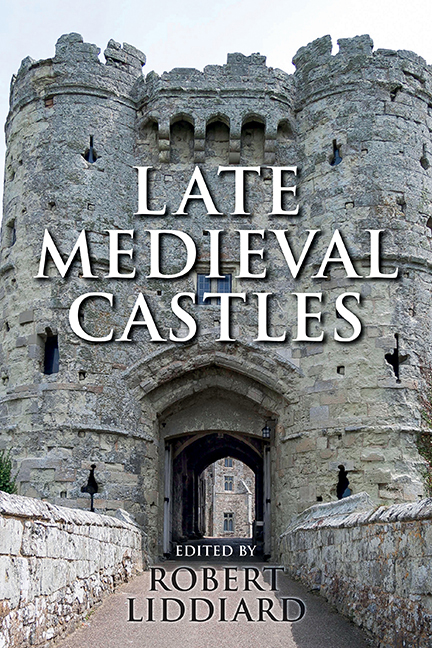Book contents
- Frontmatter
- Contents
- List of Illustrations
- Acknowledgements
- Editor's Preface
- List of Abbreviations
- A Note on the Text
- Introduction
- 1 Fourteenth-Century Castles in Context: Apotheosis or Decline?
- 2 Architects, Advisors and Design at Edward I's Castles in Wales
- 3 The Courtyard and the Tower: Contexts and Symbols in the Development of Late Medieval Great Houses
- 4 Castle Planning in the Fourteenth Century
- 5 Meaningful Constructions: Spatial and Functional Analysis of Medieval Buildings
- 6 Mota, Aula et Turris: The Manor-Houses of the Anglo-Scottish Border
- 7 Lulworth Castle, Dorset
- 8 A Scottish Problem with Castles
- 9 Structural Symbolism in Medieval Castle Architecture
- 10 Specimens of Freedom to Crenellate by Licence
- 11 Some Analysis of the Castle of Bodiam, East Sussex
- 12 English Castles in the Reign Of Edward II
- 13 Castles of Ward and the Changing Pattern of Border Conflict in Ireland
- 14 The Donjon Of Knaresborough: The Castle As Theatre
- 15 The Architecture of Arthurian Enthusiasm: Castle Symbolism in the Reigns of Edward I and his Successors
- 16 Medieval Ornamental Landscapes
- 17 Otherworld Castles in Middle English Arthurian Romance
- Guide to Further Reading
- Index
17 - Otherworld Castles in Middle English Arthurian Romance
Published online by Cambridge University Press: 29 April 2017
- Frontmatter
- Contents
- List of Illustrations
- Acknowledgements
- Editor's Preface
- List of Abbreviations
- A Note on the Text
- Introduction
- 1 Fourteenth-Century Castles in Context: Apotheosis or Decline?
- 2 Architects, Advisors and Design at Edward I's Castles in Wales
- 3 The Courtyard and the Tower: Contexts and Symbols in the Development of Late Medieval Great Houses
- 4 Castle Planning in the Fourteenth Century
- 5 Meaningful Constructions: Spatial and Functional Analysis of Medieval Buildings
- 6 Mota, Aula et Turris: The Manor-Houses of the Anglo-Scottish Border
- 7 Lulworth Castle, Dorset
- 8 A Scottish Problem with Castles
- 9 Structural Symbolism in Medieval Castle Architecture
- 10 Specimens of Freedom to Crenellate by Licence
- 11 Some Analysis of the Castle of Bodiam, East Sussex
- 12 English Castles in the Reign Of Edward II
- 13 Castles of Ward and the Changing Pattern of Border Conflict in Ireland
- 14 The Donjon Of Knaresborough: The Castle As Theatre
- 15 The Architecture of Arthurian Enthusiasm: Castle Symbolism in the Reigns of Edward I and his Successors
- 16 Medieval Ornamental Landscapes
- 17 Otherworld Castles in Middle English Arthurian Romance
- Guide to Further Reading
- Index
Summary
Castles in Middle English Arthurian romance may vary from Malory's generally undifferentiated ‘fair’ castles to the Gawain-poet's splendid Hautdesert, which is as real as the castles at Windsor and Carlisle and as ideal as those in Gothic illuminations, with their pink stone walls, azure pinnacles, and gilded gables. Whenever it appears in romance, the castle is a hierarchic image implying the existence of a mythic aristocratic society unhampered by the constraints of everyday life. The realistic aspects are drawn from contemporary models. The supernatural aspects are likely to reflect motifs in Celtic tales of heroes’ journeys to the Otherworld.
When the hero of Sir Orfeo, a Middle English metrical romance (c.1300), follows a cavalcade of splendid ladies through a rocky barrier, he emerges into a brilliantly lit green plain dominated by a crystal castle. Its hundred towers are wonderfully high, its buttresses pure gold, its vaulting elaborately enameled, its spacious apartments radiant with precious stones, its poorest pillar of burnished gold. No man might describe or imagine ‘the riche werk that ther was wrought’. The formulaic combination of crystal, gold, and jewels in a castle of consummate beauty and brilliance indicates that Sir Orfeo has entered a fairyland of marvelous beauty.
The Otherworld journey is an archetype of early Irish literature. Teigue Mac Cian, traveling across the seas, finds a silver fortress with posts of burnished gold, corridors of varicolored marble, a silver-floored hall with golden doors and diamond-studded walls. Finn and his companions, accepting the invitation of a supernatural host to enter his sidh (a faerie mound), are greeted by a hospitable company seated on crystal benches. They are entertained with harp music played by the host's beautiful daughter, served the newest meat and the oldest liquor, and given a marvelous cup that produces whatever drink is desired. An essential part of the happy Otherworld is the beautiful, generous fée who is all too willing to become a mortal's mistress. Ruad Mac Rigdon not only enjoys making love to nine gorgeous girls on nine successive nights but also receives from each one a golden cup as his reward. The sacrifice involved in returning to the natural world is expressed by Dunlang O'Hartugan just before the Battle of Clontarf:
- Type
- Chapter
- Information
- Late Medieval Castles , pp. 393 - 408Publisher: Boydell & BrewerPrint publication year: 2016



